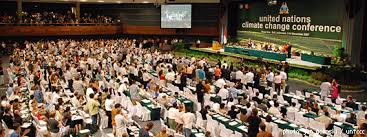What is the upcoming Paris Climate Conference all about?
As you may be aware, there is a climate conference taking place in Paris between 30 November and 11 December 2015. But what exactly is this conference (also called COP21) about?

“COP” stands for “Conference of Parties,” which is a decision making body that implements actions to tackle a specific issue identified in a convention. In this case, the convention is the UN’s Framework Convention on Climate Change (UNFCCC), which has for core objective to stabilize greenhouse gas emissions. The convention itself is non-binding and so to meet the stated objective, it is the role of the convention’s 196 parties to draw up actions and commitments at the biannual Conferences.
The first COP known as COP1 was held in Berlin in 1995 and the 21st will be held in Paris this year. Its primary focus will be on ratifying a new international agreement applicable to all countries, with aim of keeping global warming below 2°C by the end of the century. COP21 is anticipated to be one of the largest climate events ever organized.
In addition to official talks, parallel events will be organized, the largest of which being the Sustainable Innovation Forum where cross sector representatives from business, Government, finance and non-profits will be able to network and participate in interactive discussion panels at the Stade de France. There will also be various expositions and forums throughout Paris during COP21 as well as a mass mobilization campaign at the end of the event. It is becoming an increasingly popular event.
One of the most significant agreements from these climate conferences is the Kyoto protocol, which was passed in Japan at Cop3 in 1997. This protocol outlined CO2 gas emission obligations for the countries that agreed to endorse it. Although the world’s two largest polluters, China and the US, did not ratify the protocol, the EU did. It has proudly exceeded its first phase targets, reducing its total emissions levels by -18% in 2012 (on 1990 levels). For the second phase which will end in 2020, the EU is underway to exceed its target of -20% on 1990 levels since in 2014 it was already at -23%. The UK is one of the leaders in the field, since it cut its emissions by -22.5% on a target of -12.5% in 2012. The EU’s commitment to cutting its emissions while other nations stand complacent out of fear of economic repercussions reflects boldness, vision and leadership.
Yet regardless of the actions that macro political parties decide to implement in the near future, town residents have their own roles to play on a more local level. The way we see it, we hold our own COPs at least once a month to find solutions to reduce greenhouse gas emissions, particularly via the uptake of solar. If you have ideas that you would like to share with us, then please do not hesitate to get in touch or stop by at one of our social events.
